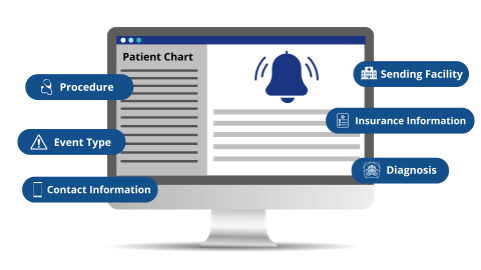Admission, Discharge, Transfer Notifications (ADT)
ADT messages have become the cornerstone in care management as the go-to source of data, holding a wealth of valuable information that can affect point-of-care decisions.
ADTs Can Come from Anywhere People Seek Care
Hospitals
Health Clinics
Psychiatric Facilities
Skilled Nursing Facilities
Primary Care providers
Home Health Agencies
Hospices
The cornerstone of care management.
Admission, Discharge, Transfer Notifications (ADTs) ADT notifications serve as alerts that are sent when a patient is admitted to a care setting, transferred to another care setting, or discharged from a care setting. These alerts notify a patient’s primary care physician and other members of the patient’s care team to ensure proper care coordination and follow-up, and to prevent unnecessary hospital readmissions and other avoidable gaps in the care continuum.
Health Level 7 (HL7) came up with ADT – Admit, Discharge and Transfer feeds to establish patient data notification services.
ADT messages have become vital in care management as the go-to source of data, holding a wealth of valuable information that can affect point-of-care decisions.
Number of ADTs MiHIN Receives Per Week
Number of ADTs MiHIN Delivers Per week
Number of Hospitals Sending ADTs
Number of Skilled Nursing Facilities Sending ADTs
Number of Home Health Agencies Sending ADTs
What information is contained in ADTs?
Where did the message come from?
The name of the care setting where the event notification is being created.
What time was the notification generated?
The time the encounter was created within a patient’s chart.
What was the event type?
There are over 50 different types of HL7 ADT messages, including:
- ADT-A01- patient admit
- ADT-A02- Patient Transfer
- ADT-A03- Patient Discharge
- ADT-AO4- Patient Registration
- ADT-A05- Patient Pre-administration
- ADT-A08- Patient Information Update
- ADT-A11- Cancel Patient Admit
- ADT-A12- Cancel Patient Transfer
- ADT-A13- Cancel Patient Discharge
You can view a full list here.
Who is the patient?
At minimum, a patient’s basic personal and demographic information.
Who is caring for the patient?
Notate who in the care setting, is providing for the patient.

Is the patient still alive?
If the encounter was terminated due to death, a date and time will be populated.
What observations have been made?
The ORU component of the notification will notate any clinical observations.
What diagnosis have been made?
The DG1 segment is used to send multiple diagnoses (for example, for medical records encoding).
Does the patient have insurance?
The IN1 segment contains insurance policy coverage information necessary to produce properly pro-rated and patient and insurance bills.
About this Use Case
MiHIN’s ADT Use Case leverages Active Care Realtionship Service to determine who is actively caring for a patient to which then, locate those whom have an active relationship within Health Directory to appropriately route the ADT notification to everyone on a patient’s care team.
While ADTs are complicated for a number of reasons, MiHIN aims to be the central connection point to get the right information, to the right people, at the point-of-care.

